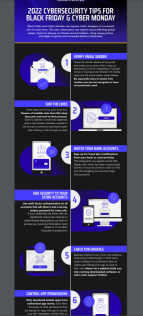With Thanksgiving and Black Friday right round the corner, shoppers are likely to be exposed to increased risk of cybercrime. This year, adversaries may exploit issues affecting global supply chains by playing on themes around inflation, rising energy prices, shortages of goods and increased delivery timescales. Here are some handy tips shared by Secureworks, to stay cyber safe.

1.VERIFY EMAIL SENDER
Check the sender address of any email that invites you to click a link or open an attachment. Look for misspellings of domain names or discrepancies between the display name and the actual sender email address. Be especially wary of emails from retailers you do not recognise or have not previously used.
2. SKIP THE LINKS
Some deals can be too good to be true. Beware of lookalike sites that offer deep discounts and hard-to-find products. Even if a website or email looks legitimate, open a new browser whenever possible to visit the real e-commerce site directly rather than clicking on links through an email.
3. WATCH YOUR BANK ACCOUNTS
Sign up for fraud alert notifications from your bank or card provider. This safeguards you against scams that falsely claim there has been unauthorized activity on your accounts in order to trick you into divulging your account login and password.
4. ADD SECURITY TO YOUR STORE ACCOUNTS
Use multi-factor authentication on all accounts that will allow it and a strong, unique password for every site.
If your credentials are stolen, this can significantly reduce the chances of cybercriminals being able to use them to access your personal information, bank details or to conduct fraudulent transactions.
5. CHECK FOR UPDATES
Malware infections can occur via malicious advertising (‘malvertising’) or third-party code running on e-commerce sites, so visitors get infected through no fault of their own. Never let a website bully you into running downloaded software or call a tech support hotline.
6.CONTROL APP PERMISSIONS
Only download mobile apps from authorized app stores. Even then, be aware of what permissions they are asking for. Apps that ask to access
your text messages, contact lists, or passwords should be treated as highly suspicious. Remove any apps that you don’t need or don’t use any more.
Content & Infographic source: Secureworks.com





